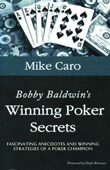
Don’t listen to phil hellmuth
SCU:978-1-58042-308-3
Dusty Schmidt
Dusty “Leatherass9” Schmidt is a genuine success tale in the realm of online poker. He started as an “Average Joe” betting on small-stakes games and eventually converted that into a fortune worth millions, alongside a sponsorship contract with PokerStars. In his debut book, “Treat Your Poker Like a Business,” Schmidt divulged some of his secrets to becoming a successful internet sensation and provided a roadmap for micro- and small-stakes players to emulate his success.
After receiving widespread praise for his debut book, Schmidt collaborated with Christopher Hoppe to pen his sophomore publication, “Don’t Listen to Phil Hellmuth.” The book purports to debunk the 50 worst poker tips you’ve ever encountered. Priced at $49.99, it can be purchased as a physical copy or as a PDF that is compatible with most common e-readers.
The premise of the book is certainly provocative, and it’s clear that the title was chosen to generate buzz and stir up some controversy. Given that the book is exclusively sold online, there’s a bit of flexibility with regard to self-promotion techniques, so it’s hard to be overly critical of the blatant headline-grabbing tactic employed through the title.
Despite being a participant in low-stakes games and intending to transition to mid-stakes games by the end of the year, I find myself increasingly aligning with the book’s premise: the guidance we initially received when we dived into poker is significantly out-of-date. The book’s objective is to modernize that counsel with a practical approach.
The book commences with a candid examination of past advice from poker pundits on TV and trainers on websites. The book’s tone is predominantly analytical, a wise choice since a book with a petulant and resentful tone would have repelled many readers. The introduction establishes the tone effectively and showcases the fact that poker is a dynamic game that is perpetually changing.
The book is made up of 50 sections, each tackling a common misbelief in the realm of poker. Each section identifies the misbelief, then dissects the truth and untruth behind it, while illustrating its applicability in contemporary micro- and small-stakes games. Every section spans approximately four pages and often includes examples of hand history if the topic necessitates it.
Undoubtedly, the counsel provided will spark a lot of discussion, but the intention is to stimulate thought around intriguing poker scenarios. The book provides a real-life glimpse into the games in relation to each misbelief, and it’s certain that within the 50 sections, readers will discover valuable pearls of wisdom.
The book doesn’t strictly follow a sequential layout, which means that the chapters don’t need to be read in a particular sequence to be understood. If you come across any intriguing misconceptions in the table of contents, feel free to jump right to them. It won’t affect your overall reading experience.
In the second half of the book, there’s a section called “25 Hands with Dusty Schmidt”. Here, the authors analyze hands from mid and high-stakes cash games. This section is filled with intriguing situations that Schmidt faced, with a particular focus on countering certain types of opponents and ranges. It’s likely that the strategies employed by Schmidt and the ensuing summaries will spark some discussions.
Upon reading approximately 80 pages that cover various hand histories, the book concludes with a “Study” section. This section features a comprehensive quiz with 60 questions spread across 27 pages. The answers are provided on the final page for your reference.
In essence, “Don’t Listen to Phil Hellmuth” provides an intelligent examination of several widespread misconceptions that many players often misapply. Its content undeniably holds relevance in the current poker landscape, making it particularly useful and relevant for micro-stakes and small-stakes regular players.
While the book’s price might be considered steep, if you appreciate Schmidt’s work and are seeking a practical, real-world applicable poker book, then “Don’t Listen to Phil Hellmuth” could prove to be a worthwhile read for you.






